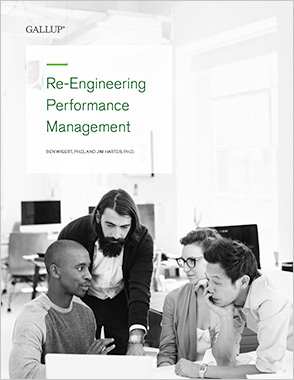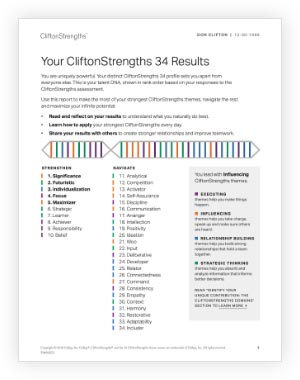Story Highlights
- Most employees aren't inspired to improve by performance reviews
- Having the right conversations directly affects performance
- Using CliftonStrengths helps identify points of excellence and blind spots
As it stands, only 14% of employees strongly agree that the performance reviews they receive inspire them to improve. This means that 86% of employees, an overwhelming majority, are not inspired to improve based on performance reviews alone.
Leaders must inspire performance. But, how?
One way is to be "radically transparent" about performance. In this kind of culture, employees are expected to embrace direct feedback about their performance all the time -- including criticism.
Ray Dalio, founder of the financial firm Bridgewater Associates, described his motivation for creating a "radically transparent" culture to Adam Grant, an organizational psychologist at the Wharton School, in an episode of Grant's WorkLife podcast.
In the podcast, Dalio reflects on a painful experience in his early career. He describes being overly confident and surrounded by people who constantly said yes. This left "no one around to check his ego," and he eventually failed. Rather than see others suffer the same fate, he now advocates for candor, directness and constant feedback about performance.
It begs the question: Is this radically transparent feedback the best way to inspire performance?
Dalio is on to something. Feedback is essential for growth and development, and being left in the dark about blind spots can lead to vulnerability and failure. And so, for the people Dalio managed, like it or not, they knew where they stood!
This candid feedback likely works for him in the culture he has created. In this "radical transparency," those who join and stay must appreciate that style.
However, there is another way.
Gallup has discovered that there are five critical conversations that drive performance.
Having the right conversations directly affects performance.
These five conversations are structured to facilitate an opportunity for the manager to authentically connect with each member of the team so that they can gain an individualized understanding of each person -- a key and necessary driver of honest, direct communication and engagement that translates to performance.
In this model, managers become active and empathetic listeners, attending to what is working well for the employee and keeping an eye out for potential obstacles and barriers. With this approach, the manager and employee align early on about what success looks like and then maintain a regular cadence of connections in which the manager is coaching that employee based on a shared vision of what excellence in the role looks like.
From great conversations comes amplified trust, which increases the effectiveness of feedback. And over time, honest discussions allow the employee and the manager to collaboratively align on expectations that serve business needs while allowing the employee to do more of what they do best.
During these conversations, managers should ask direct questions (like "What activities energize you in your job?" "Of all the things you do well, what are three things that you do best?") aimed at identifying the core interests and strengths of each person. The answers to these questions can help fuel a manager's ability to recommend the right assignments for the employee and ultimately to guide them toward the right developmental opportunities for the long run.
Using CliftonStrengths helps identify points of excellence and blind spots.
This is where leveraging CliftonStrengths can make a difference too. Based on four decades of behavioral research, the CliftonStrengths assessment identifies the areas where an individual's greatest potential for building strengths exists. CliftonStrengths enables managers and employees to "name" their strengths using a common language. It allows them to quickly identify areas of potential excellence and blind spots -- and how natural tendencies contribute to both. In this way, they are radically transparent with each other about areas of potential and possible hurdles, right from the start.
And when trust has been built through conversations and relationships, even challenging conversations can become … less challenging. Performance issues can often be understood as misalignments, rather than as criticisms, allowing for quicker resolution while preserving engagement. And if conversations are happening the right way, an employee is never caught off guard during a performance review. Remember the pain that Ray Dalio experienced when he failed without forewarning? Staying connected helps prevent such surprises.
In the end, Dalio's radically transparent approach is inspiring, for its directness, and works well for his team -- but for those not on his team, more may be needed. We have an opportunity to take the best of what he offers and to maximize it. Having clear line of sight to performance is essential; however, there is more.
When managers coach their employees through ongoing, strengths-based conversations, they build trust by meeting the individual needs of each person. In doing so, they can honestly acknowledge what isn't working so that role expectations can be defined, clarified or adjusted accordingly.
What results is an opportunity for managers to have authentic, meaningful relationships with employees while driving performance and development based on what each person needs and does best.
Ready to step past performance reviews and into the future of performance management?
- Read Gallup's Re-Engineering Performance Management report to learn more about taking a better approach to performance reviews.
- The Gallup Access platform offers the tools and solutions you need to feel empowered to have the right conversations with employees.
- Learn more about Gallup's Boss to Coach Journey, where you will learn how to tackle critical employee challenges and support team performance by having strengths-based, engagement-focused and performance-oriented coaching conversations.





